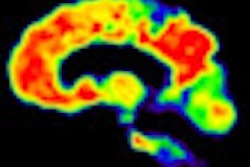
NEW YORK (Reuters Health), Sep 24 - Increased brain amyloid load is associated with an increased risk of progression from mild cognitive impairment to Alzheimer's disease, according to a report in the September 8 issue of Neurology.
In a study involving 31 subjects with mild cognitive impairment, in vivo measurement of brain amyloid using carbon-11-labeled Pittsburgh Compound B (C-11 PiB) PET proved to be "a potential tool for providing prognostic information" on "increased risk of converting to Alzheimer's disease," Dr. Aren Okello from Imperial College London told Reuters Health by e-mail.
Because PET allows correlation of brain amyloid deposition with patient status, Okello and colleagues followed their subjects over one to three years, analyzing rates of progression to clinically probable Alzheimer's disease in PiB-positive patients.
Altogether, there were 17 subjects with C-11 PiB retention at baseline. Fourteen of these PiB-positive patients, and one subject without C-11 PiB retention, developed Alzheimer's disease.
The converters had higher PiB retention in all cortical brain regions, compared to those who did not progress to Alzheimer's disease, both with and without correction for age.
Eight of the 17 PiB-positive subjects progressed to Alzheimer's disease within a year. These individuals had higher PiB retention values in the anterior cingulate and frontal cortex than did the slower converters and nonconverters, although these differences disappeared after adjustment.
APOE-epsilon-4 status was known for 17 subjects. Seven were carriers, of whom four were PiB-positive faster converters and two were PIB-positive slow converters.
"We are currently following up these amnestic mild cognitive impairment patients with serial C-11 PiB scans," Okello said. "This will enable us to assess whether changes in amyloid deposition over time, if present, as measured by C-11 PiB PET may provide further prognostic information in those mild cognitive impairment patients who had not converted to Alzheimer's disease during the initial follow-up period."
"The importance of these findings will greatly increase if antiamyloid strategies prove effective treatment in Alzheimer's disease," Okello added.
"The role of C-11 PiB (and similar ligands for beta-amyloid deposits) in routine clinical practice needs to be further defined, relative to other diagnostic markers of Alzheimer's disease," according to the authors of a related editorial.
In addition, write Dr. Pieter Jelle Visser from VU University Medical Center, Amsterdam, Netherlands, and Dr. David Knopman from Mayo Clinic, Rochester, MN, the relation between amyloid retention and cognitive decline "in subjects without dementia with nonamnestic mild cognitive impairment and subjective cognitive impairment, or in subjects without any cognitive impairment, needs further study."
By Will Boggs, M.D.
Neurology 2009;73:754-760,744-745.
Last Updated: 2009-09-23 17:40:02 -0400 (Reuters Health)
Related Reading
PET with C-11 PiB can assess beta-amyloid brain deposits, August 12, 2008
Copyright © 2009 Reuters Limited. All rights reserved. Republication or redistribution of Reuters content, including by framing or similar means, is expressly prohibited without the prior written consent of Reuters. Reuters shall not be liable for any errors or delays in the content, or for any actions taken in reliance thereon. Reuters and the Reuters sphere logo are registered trademarks and trademarks of the Reuters group of companies around the world.


















